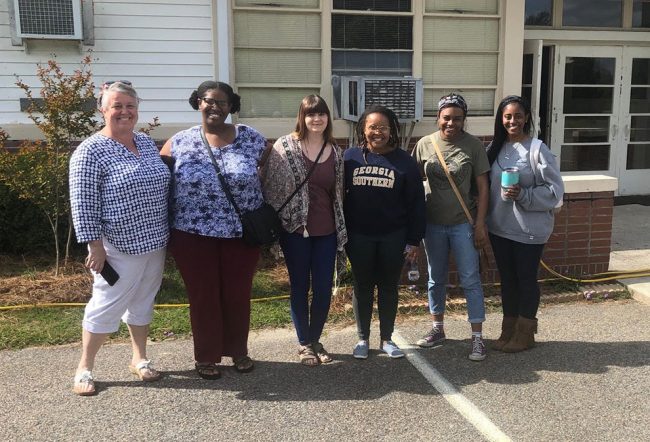
The Georgia Southern University Department of Sociology and Anthropology is partnering with the Willow Hill Heritage and Renaissance Center (WHHRC) in Portal, Georgia, to help families in Bulloch County get access to technology and the internet., Participants who need to access the internet during the COVID-19 pandemic will check out and use equipment at an outdoor facility with tables, electricity and fans.
Associate Professor of Anthropology, Heidi Altman, Ph.D., said student volunteers will assist with checking laptops in and out, greeting families and facility users, and assisting users with signing in to the Wi-Fi, among other responsibilities.
“Families in Bulloch County have the choice of face-to-face or virtual school, but that choice is not a real choice for families who do not have access to the internet,” Altman said. “If the family is living in the digital divide, they may not have adequate access to the internet at the speeds needed to participate in virtual learning. If families have to share a device, especially if that device is a smartphone or tablet, their access is further limited.”
WHHRC’s initiative to expand internet access and technology is being funded by a $109,420 CARES Act grant from the Institute for Museum and Library Services. The grant requires documentation of user data in order to make sure the program is sustainable.
“Our anthropology students will collect the anonymous user data, compile and analyze it and provide a report back to the WHHRC board for inclusion in the grant reporting,” Altman said. “In addition to providing necessary data for the grant, this is an opportunity for our students to gain hands-on experience working with actual data from an applied anthropology project.”
The Department of Sociology and Anthropology has worked with WHHRC before helping digitize archives, taking inventory of collections and volunteering at events. Altman said she’s happy to continue the partnership with the important task of getting underserved people the technology they need.
“Without adequate internet access, it is hard for adults to seek employment, to conduct banking business or to stay up to date with information about their children’s school,” she said. “In an era where the internet has come to be seen as a necessary element of life, many of our neighbors are being left out.”
Information from Georgia Southern University.


Chattooga Local Government
Sens. Ossoff, Rev. Warnock Delivering Drinking Water Upgrades through Bipartisan Infrastructure Law

Bulloch Public Safety
02/16/2026 Booking Report for Bulloch County

Bulloch Public Safety
01/20/2026 Booking Report for Bulloch County

Bulloch Public Safety
01/26/2026 Booking Report for Bulloch County

Bulloch Public Safety
02/09/2026 Booking Report for Bulloch County

Bulloch Public Safety
01/22/2026 Booking Report for Bulloch County

Bulloch Public Safety
02/02/2026 Booking Report for Bulloch County







